Your baby is now officially an embryo and is about the size of a poppy seed.
Please visit www.nhs.uk/conditions/pregnancy-and-baby/4-weeks-pregnant/ for more information.
Local Maternity and Neonatal System
View navigation
Support
The risk of developing a mental health problem during the perinatal period (the time between becoming pregnant and your baby’s first birthday) is greater than developing a physical illness. In fact more than 1 in 4 mothers and 1 in 10 fathers experience symptoms of depression or anxiety during this time. We understand that this can be a very difficult and confusing time. Many parents worry that having a problem with their mental health means that they are a bad parent, or fear that they will be judged by health care professionals.
Humber and North Yorkshire Health and Care Partnership’s specialist perinatal mental health team, covering Hull, East Riding of Yorkshire, North Lincolnshire, and North East Lincolnshire, re-launched the Every Mum Matters campaign in January 2022. Every Mum Matters supports new and expectant mums and their families to be able to recognise symptoms of perinatal mental health problems early and encourages them to seek help quickly. which offers guidance and signposting for further help. A video has been created featuring women affected by mental health issues during and after pregnancy and can be accessed here .
You can visit the Every Mum Matters pages on this website for more information, support, and advice.
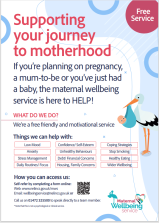 For women and birthing people living in North East Lincolnshire, a Maternal Wellbeing Service was launched by North East Lincolnshire Council in December 2023.
For women and birthing people living in North East Lincolnshire, a Maternal Wellbeing Service was launched by North East Lincolnshire Council in December 2023.
It is a free, friendly and motivational service that can support you with your Wellbeing before, during and after your pregnancy. It will help you to set wellbeing goals and will support you along your maternal journey. The programme consists of up to 9 contacts throughout pregnancy and will keep in touch up to your baby’s first birthday. For more information on how to access the service please contact the team on 01472 325500 or you can self-refer online at www.nelincs.gov.uk/mws or email wellbeingservice@nelincs.gov.uk.
The Maternal Wellbeing Service leaflet can be accessed here.
We would like you to know that you are not alone and mental health problems can often be very easily treated.
Taking care of your mental health is just as important as staying physically well. There are many practical things you can do to help protect your mental health.
You may be referred into a specialist perinatal mental health service. These services are designed to provide expert care to women and their families, who may develop moderate to severe symptoms of mental health problems during the perinatal period.
Dads may feel a range of different emotions and need support from services such as Andy's Man Club as well as health professionals.

Your baby is now officially an embryo and is about the size of a poppy seed.
Please visit www.nhs.uk/conditions/pregnancy-and-baby/4-weeks-pregnant/ for more information.
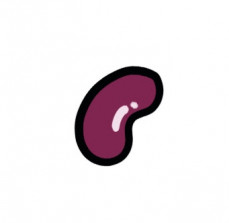
Your baby is now the size of a kidney bean and weighs 1g.
Please visit www.nhs.uk/conditions/pregnancy-and-baby/8-weeks-pregnant/ for more information.
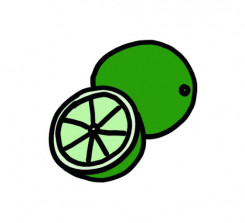
Welcome to the second trimester!
Your baby is about the size of a small lime and weighs approximately 14g.
You have hopefully seen your midwife for your 'booking in' appointment, if you have not yet seen a midwife please make an appointment quickly, so you can have all of your choices about screening tests explained and offered to you.
Please visit www.nhs.uk/conditions/pregnancy-and-baby/12-weeks-pregnant/ for more information. You can also link to the 'Pregnancy Journey' area here.

Your baby is about the size of an avocado and weighs approximately 100g.
Please visit www.nhs.uk/conditions/pregnancy-and-baby/16-weeks-pregnant/ for more information.

Your baby has grown in length and is now the length of a small banana and weighs approximately 300g. Around this time you will be offered your '20 week' scan, also known as the 'anatomy' or 'anomaly' scan.Click here for more information about screening.
This is a also a good time to talk and sing to your bump as your baby can now hear sounds. This is great way for you and your partner/family to bond with your baby.
Please visit www.nhs.uk/conditions/pregnancy-and-baby/20-weeks-pregnant/ for more information.

Your baby has grown again to the approximate length of an ear of sweetcorn and weighs about 600g.
Please visit www.nhs.uk/conditions/pregnancy-and-baby/24-weeks-pregnant/ for more information.

Welcome to the third trimester!
Your baby is now approximately the weight of an aubergine; about 1kg and approximately 37cm in length.
Please visit www.nhs.uk/conditions/pregnancy-and-baby/28-weeks-pregnant/ for more information.
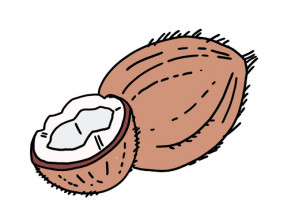
Your baby now weighs approximately the same as a coconut; around 1.5kg.
Please visit www.nhs.uk/conditions/pregnancy-and-baby/32-weeks-pregnant/ for more information.
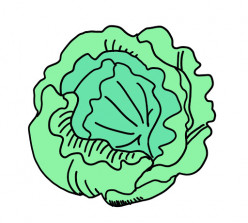
Your baby is now around the same size as a lettuce, approximately 47cm long and weighs around 2.6kg.
Please visit www.nhs.uk/conditions/pregnancy-and-baby/36-weeks-pregnant/ for more information.

Your baby is now the weight of a small watermelon which is approximately 3.3kg and around 50cm in length.
Please visit www.nhs.uk/conditions/pregnancy-and-baby/40-weeks-pregnant/ for more information.